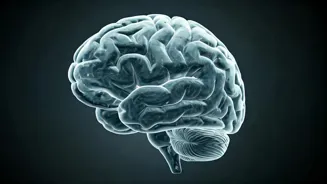Spotting the Fog
Brain fog, a common but often misunderstood phenomenon, can significantly impact cognitive function. Recognizing its presence is the first step towards
managing it effectively. One key indicator of brain fog is difficulty concentrating. This can manifest as a wandering mind, struggles to stay focused on tasks, or an inability to absorb information. Another telltale sign is forgetfulness, such as misplacing items frequently or struggling to recall recent conversations or events. Furthermore, brain fog often presents as mental fatigue, where the brain feels exhausted, leading to a lack of mental clarity and an overall feeling of being overwhelmed. These cognitive impairments can lead to decreased productivity, increased frustration, and a general sense of mental disarray. Understanding these common signs can help individuals identify brain fog and seek appropriate solutions to address its impact.
Memory Lapses Unveiled
Memory lapses are a significant component of brain fog, impacting both short-term and long-term recall. One manifestation is the frequent experience of walking into a room and forgetting the initial purpose. This kind of memory gap can be frustrating and disorienting, making it difficult to maintain the flow of daily activities. Another common memory issue is the struggle to remember names or details of recent conversations. This can cause social discomfort and contribute to feelings of inadequacy. Furthermore, brain fog can make it harder to retain new information. Reading becomes challenging when the brain has trouble processing and storing facts, impacting comprehension and learning abilities. These memory-related effects highlight the need for individuals to recognize and manage brain fog to improve cognitive health and boost overall life quality.
Fog's Impact on Focus
Brain fog significantly impairs focus and attention, posing a challenge in completing tasks and staying mentally present. Individuals with brain fog might find their attention easily distracted by external stimuli, making it tough to maintain concentration on tasks, whether at work, home, or elsewhere. This lack of focus directly affects productivity, often leading to more time needed to accomplish even simple assignments. Additionally, the fog blurs mental clarity, making complex information difficult to comprehend. When the brain struggles to process and retain information, decision-making becomes more difficult, leading to frustration and a lack of confidence. The overall effect of brain fog on focus and attention includes a feeling of being mentally scattered, which impacts daily life. Taking measures to address brain fog and restore mental sharpness is crucial to enhance cognitive capabilities and improve general well-being.
Factors Triggering Fog
Several factors contribute to the onset and severity of brain fog, which makes it essential to recognize and manage them. Diet plays a vital role; nutrient deficiencies, excessive sugar consumption, and processed foods can all contribute to cognitive impairment. Inadequate sleep disrupts the brain's natural processes, leading to daytime drowsiness and poor concentration. Hormonal imbalances, such as those occurring during menopause, can cause significant cognitive effects, including memory issues and foggy thinking. Furthermore, chronic stress and anxiety can strain the brain, making it more challenging to focus, recall information, and make decisions. Addressing these underlying factors, such as modifying the diet, improving sleep patterns, managing stress, and seeking medical guidance for hormonal imbalances, is crucial to mitigating brain fog and supporting cognitive health.
Seeking Clarity: Strategies
Various strategies help clear brain fog and enhance cognitive function. Regular physical exercise is essential, as it improves blood flow to the brain, boosts mood, and sharpens focus. Moreover, a balanced diet rich in whole foods, fruits, vegetables, and lean proteins is crucial. Staying well-hydrated is vital, as even mild dehydration can impact cognitive performance. Engaging in mindfulness practices like meditation and deep breathing can help reduce stress and enhance mental clarity. Getting enough high-quality sleep, which includes establishing a regular sleep schedule and creating a relaxing bedtime routine, is also vital. Furthermore, incorporating brain-training activities, such as puzzles and memory games, can strengthen cognitive skills and combat the effects of brain fog. By adopting these lifestyle changes, individuals can effectively mitigate brain fog and support improved cognitive wellness.
Mindfulness for Mental Clarity
Mindfulness is a powerful tool for addressing brain fog and enhancing mental clarity. It involves consciously focusing on the present moment, helping to calm the mind and lessen stress, which can often exacerbate cognitive issues. Regular practice of meditation is a core element of mindfulness. This involves sitting quietly, focusing on the breath, and gently bringing the attention back to the present moment each time the mind wanders. Even a few minutes of meditation daily can make a significant impact. Incorporating mindful practices into daily routines, like eating slowly and fully savoring each bite, can deepen the awareness of the present and counteract mind-wandering. Through mindfulness, individuals learn to observe thoughts and feelings without judgment, minimizing mental chatter and clearing the path for focused thought. This practice improves concentration, lowers anxiety, and bolsters overall cognitive performance, leading to a sharper, clearer mind.
The Power of Exercise
Physical exercise serves as a pivotal approach to combatting brain fog and improving cognitive function. Regular exercise enhances blood flow to the brain, boosting oxygen and nutrient delivery. This increased circulation is critical for promoting brain health and cognitive performance. Exercise also sparks the release of endorphins, natural mood boosters that can alleviate stress and anxiety, common contributors to brain fog. Furthermore, routine physical activity is linked to the development of new brain cells and improved cognitive functions, particularly in memory and attention. Incorporating a variety of exercises, such as aerobic activities like running or swimming and strength training, offers diverse benefits. Aiming for at least 30 minutes of moderate-intensity exercise most days of the week is recommended. Exercising regularly not only sharpens cognitive skills but also contributes to overall physical health and well-being.














